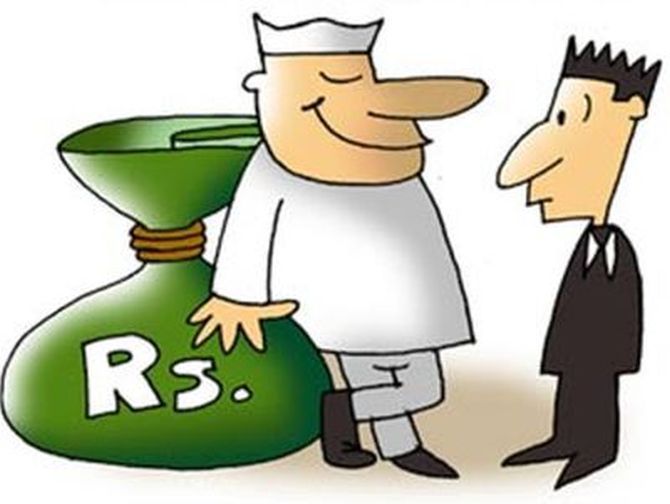DTC task force also favoured doing away with Dividend Distribution Tax by suggesting taxing dividends in the hands of shareholders.
Illustration: Uttam Ghosh/Rediff.com

The Direct Tax Code (DTC) task force, set up to overhaul the 58-year-old Income Tax Act, has recommended a significant increase in the highest income tax slabs, besides slashing the corporate tax rate to an even rate of 25 per cent for both domestic and foreign companies, sources in the know said.
Income tax payers earning up to Rs 55 lakh per annum may end up with a major tax relief if recommendations to change the tax bracket and rebates are accepted, according to sources.
The eight-member task force, led by Central Board of Direct Taxes member Akhilesh Ranjan, submitted the report to Finance Minister Nirmala Sitharaman on Monday.
Addressing disruption caused by the US tax reforms last year, the panel has pressed for a corporate tax cut for domestic and foreign firms to 25 per cent from 30 per cent for large companies and 40 per cent for overseas firms.
The US had cut the rate from 35 per cent to 21 per cent last year.
However, foreign firms may have to pay branch profits tax on the amount repatriated to their foreign partner.
This was also part of the previous version of the draft DTC 2013.
The panel also favoured doing away with Dividend Distribution Tax by suggesting taxing dividends in the hands of shareholders.
The task force suggested replacing the concept of assessing officer with assessment units, besides faceless scrutiny of cases picked through centrally and randomly allotted mechanism.
Aimed at reducing tax litigation, the panel recommended the concept of mediation between taxpayer and the CBDT.
Taxpayers may be allowed to opt for a negotiated settlement before a Collegium of Commissioners once they receive the draft order, according to sources.
In her maiden Budget speech, Sitharaman had cut corporate tax for firms with an annual turnover of up to Rs 400 crore to 25 per cent from 30 per cent, covering 99.3 per cent companies.
“Only 0.7 per cent are left... Even for them gradually we will be able to bring down the tax to the level of 25 per cent,” Sitharaman said at an event on Monday.
Recently, the CBDT raised the threshold for filing appeals in tax disputes to reduce tax litigation.
They increased the amount for Income Tax Appellate Tribunal to Rs 50 lakh from Rs 20 lakh, for high court from Rs 50 lakh to Rs 1 crore and Surpreme Court to Rs 2 crore from Rs 1 crore.
Besides, the panel recommended a Litigation Management Unit to manage the entire tax litigation process, right from deciding in which cases the appeals ought to be filed to devising the strategy to defend a case, according to sources.
For transfer pricing cases, a separate functional assessments unit may be set up for a block of 4 years, sources said.












 © 2025
© 2025